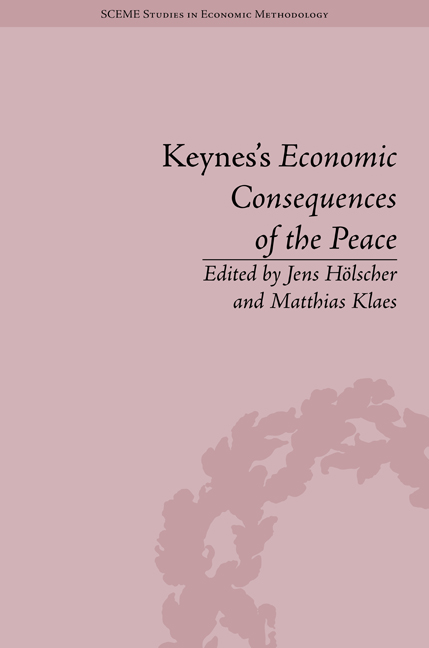Book contents
- Frontmatter
- CONTENTS
- List of Figures
- List of Contributors
- Introduction: Standing the Test of Time: Maynard Keynesas's Economic Consequences of the Peace, a Century On
- Part I The Consequences in their Time
- Part II The Consequences Today
- 5 A Methodological Reading of Economic Consequences of the Peace
- 6 Building New Monetary Institutions in the EMU as a Response to the Financial Crisis: A Keynesian Perspective
- 7 The Economic Consequences of the Euro: Lessons from History
- 8 Keynes and the Economic Consequences of the European Union
- Part III Keynes: A Play
- Notes
- Index
8 - Keynes and the Economic Consequences of the European Union
from Part II - The Consequences Today
- Frontmatter
- CONTENTS
- List of Figures
- List of Contributors
- Introduction: Standing the Test of Time: Maynard Keynesas's Economic Consequences of the Peace, a Century On
- Part I The Consequences in their Time
- Part II The Consequences Today
- 5 A Methodological Reading of Economic Consequences of the Peace
- 6 Building New Monetary Institutions in the EMU as a Response to the Financial Crisis: A Keynesian Perspective
- 7 The Economic Consequences of the Euro: Lessons from History
- 8 Keynes and the Economic Consequences of the European Union
- Part III Keynes: A Play
- Notes
- Index
Summary
Keynes on the Versailles Conference: Proposals and Reality
The motives of the author of Economic Consequences of the Peace have been most scrupulously dealt with at length in Skidelsky's unsurpassed biography of Keynes. Suffice it to say, that anyone who has read Economic Consequences cannot but be impressed by the moral courage of the author to criticize what, at the time, was seen as a diplomatic and political triumph of the Allies. In this paper, I will focus on Keynes's analysis and recommendations in order to make certain comparisons to the current crisis of the euro zone and the European Union (EU). Hopefully Keynes's approach can highlight some of the detrimental aspects of current policies as well as to point to some possible solutions to the ongoing crisis.
The destruction of a world that had been perceived as moving rapidly to prosperity and technological advance, as never before in human history, indeed the world of the first modern globalization, seems to be a good beginning for a discussion on Economic Consequences and its contemporary relevance. World War I and the end of the belle époque came as an unexpected catastrophe and exposed the precarious nature of a world order that disappeared overnight.
- Type
- Chapter
- Information
- Keynes's Economic Consequences of the PeaceA Reappraisal, pp. 145 - 164Publisher: Pickering & ChattoFirst published in: 2014



